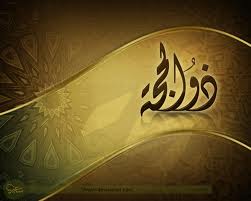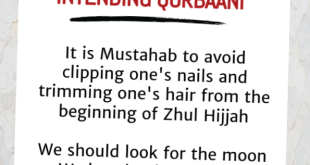 1. Dhul Hijja is from the four sacred months of the Islamic calendar. The four sacred months are Dhul Qa’dah, Dhul Hijja, Muharram and Rajab. The rewards of any good deed done in these months are multiplied, and the sins committed in these months are also regarded as more serious. Allah Ta’ala says:
1. Dhul Hijja is from the four sacred months of the Islamic calendar. The four sacred months are Dhul Qa’dah, Dhul Hijja, Muharram and Rajab. The rewards of any good deed done in these months are multiplied, and the sins committed in these months are also regarded as more serious. Allah Ta’ala says:
إِنَّ عِدَّةَ الشُّهُورِ عِندَ اللَّـهِ اثْنَا عَشَرَ شَهْرًا فِي كِتَابِ اللَّـهِ يَوْمَ خَلَقَ السَّموتِ وَالْأَرْضَ مِنْهَا أَرْبَعَةٌ حُرُمٌ (سورة التوبة)
The number of months in the sight of Allah is twelve (in a year), so ordained by Him the day He created the heavens and the earth; from among them four are sacred.
2. The greatness of the first ten days and nights of Dhul Hijja can be gauged by the fact that Allah Ta’ala had taken a qasm on the first ten nights of Dhul Hijja in the Qur’an Majeed, and special virtues have been recorded in the Ahaadith of Rasulullah (Sallallahu Alaihi Wasallam) regarding these days. Allah Ta’ala says:
وَٱلْفَجْرِ ﴿١﴾ وَلَيَالٍ عَشْرٍ ﴿٢﴾
(Qasam) By the break of dawn and by the ten nights (of Dhul Hijja)
3. One should exert oneself in ibaadat during the first ten days of Dhul Hijja. Great rewards have been mentioned regarding the ibaadat made during these ten days.
عَن اِبنِ عَبَّاس رَضِيَ اللهُ عَنهُمَا عَن النَّبِي صَلَّى اللهُ عَلَيهِ وَسَلَّم أَنَّهُ قَال مَا العَمَلُ فِي أَيَّامٍ أَفْضَلَ مِنهَا فِي هَذِهِ قَالُوا وَلَا الجِهَاد قَالَ وَلاَ الجِهَاد إِلَّا رَجُلٌ خَرَجَ يُخَاطِرُ بِنَفْسِهِ وَمَالِهِ فَلَمْ يَرْجِع بِشَيءٍ (بخاري 1/132)
Hazrat Abdullah ibn Abbas (Radhiallahu Anhu) reports that Nabi (Sallallahu Alaihi Wasallam) said, “There is no virtuous deed carried out in any day of the year that can be equal to the reward of (that virtuous deed) carried out in these ten days of Dhul Hijja.” The Sahabah asked, “Not even Jihaad?” Rasulullah (Sallallahu Alaihi Wasallam) replied, “Not even Jihaad, except for the one who endangers his life and wealth (in Jihad) and does not return with anything (i.e. the Jihad carried out in the ten days of Dhul Hijja is more virtuous than Jihad during the rest of the year except for that Mujaahid who gains martyrdom).”
4. One should fast during the first ten days. By fasting any of the first ten days of Dhul Hijja (besides the tenth), one will get the reward of fasting the entire year.
5. One should endeavour to make as much ibaadat as possible in the first ten nights of Dhul Hijja. Making ibaadat on these nights earns one the reward of making ibaadat on Laylatul Qadr.
عَن أَبِي هُرَيرَة رَضِي اللهُ عَنهُ عَن النَّبِي صَلَّى اللهُ عَلَيهِ وَسَلَّم : قَالَ مَا مِن أَيَّامٍ أَحَبَّ إِلَى اللهِ أَن يُتَعَبَّدَ لَهُ فِيهَا مِن عَشَرِ ذِي الحِجَّةِ يَعْدِلُ صِيَامُ كُلِّ يَومٍ مِنهَا بِصِيَامِ سَنَةٍ وَقِيَامُ كُلِّ لَيْلَةٍ مِنْهَا بِقِيَامِ لَيْلَةِ القَدْرِ (ترمذي 1/158)
Hazrat Abu Hurayrah (Radhiallahu Anhu) reports that Rasulullah (Sallallahu Alaihi Wasallam) said, “There are no days in the year wherein the worship of Allah Ta’ala is more beloved to Him than the ten days of Dhul Hijjah. The fast during these days (excluding the tenth) is equivalent to the fast of an entire year and standing up in ‘ibaadah during these nights is equivalent to the reward of the night of Qadr (power).”
عَنْ حَفْصَةَ رضي الله عنها قَالَتْ أَرْبَعٌ لَمْ يَكُنْ يَدَعُهُنَّ النَّبِيُّ صَلَّى اللَّهُ عَلَيْهِ وَسَلَّمَ صِيَامَ عَاشُورَاءَ وَالْعَشْرَ وَثَلَاثَةَ أَيَّامٍ مِنْ كُلِّ شَهْرٍ وَرَكْعَتَيْنِ قَبْلَ الْغَدَاةِ (النسائي 1/328)
Hazrat Hafsah (Radhiallahu Anha) reports that Rasulullah (Sallallahu Alaihi Wasallam) would not leave out four actions: Fasting on the day of Aashuraa, fasting on the first ten days of Dhul Hijja (i.e. besides the 10th), fasting three days of every month; and performing two rakaats Sunnah before the fardh of Fajr.
6. Nabi (Sallallahu Alaihi Wasallam) has mentioned that Paradise becomes waajib for that person who worships Allah Ta’ala on five nights. i.e. the night of Tarwiya ( 8th of Dhul Hijja), the night of Arafah (9th of Dhul Hijja), the night of nahr (10th of Dhul Hijja), the night of Eid ul Fitr and the night of the 15th of Sha’baan.
عَن مُعَاذ بنِ جَبَلٍ رَضِيَ اللهُ عَنهُ قَالَ قَالَ رَسُولُ اللهِ صَلَّى اللهُ عَلَيهِ وَسَلَّمَ مَن أَحْيَا اللَّيَالِيَ الخَمْسَ وَجَبَتْ لَهُ الجَنَّة لَيَلَةَ التَرْوِيَة وَ لَيْلَةَ عَرَفَةَ وَلَيْلَةَ النَّحْرِ وَلَيْلَةَ الفِطْرِ وَ لَيْلَةَ النِّصْفِ مِن شَعْبَان. (الترغيب و الترهيب 2/96)
Hazrat Muaadh ibn Jabal (Radhiallahu Anhu) reports that Rasulullah (Sallallahu Alaihi Wasallam) said: “The one who enlivens five nights of the year with ibaadat, Jannat becomes compulsory for him. The night of Tarwiya ( 8th of Dhul Hijja), the night of Arafah (9th of Dhul Hijja), the night of nahr (10th of Dhul Hijja), the night of Eid ul Fitr and the night of the 15th of Sha’baan.”
7. It is sunnah for one (who is not in the state of ihram) to fast on the day of Arafah i.e. 9th of Dhul Hijja. Apart from receiving the reward of one year’s fast, two years sins will also be forgiven.
عَن أبي قَتَادَة رَضِي اللهُ عَنه أَنَّ رَجُلاً سَأَلَ النَّبِيَّ صَلَّى اللهُ عَلَيهِ وَ سَلَّمَ فَقَالَ : يَا رَسُولَ اللهِ أَرَأيتَ رَجُلًا يَصُومُ يَومَ عَاشُورَاء ؟ قَالَ : ذَاكَ صُومُ سَنَةٍ قَالَ : أَرَأَيتَ رَجُلًا يَصُومُ يَومَ عَرَفَةَ قَالَ يُكَفِّرُ السَّنَةَ وَمَا قَبْلَهَا (ابن حبان رقم 8/394)
Hazrat Abu Qataadah (Radhiallahu Anhu) reports that once a Sahaabi asked Rasulullah (Sallallahu Alaihi Wasallam), “O Rasulullah (Sallallahu Alaihi Wasallam), what is the reward of the person who fasts on the day of Aashurah?” Nabi (Sallallahu Alaihi Wasallam) replied, “It carries the reward of fasting for an entire year.” The Sahaabi then asked, “What is the reward of fasting on the day of Arafah?” Rasulullah (Sallallahu Alaihi Wasallam) replied, “It expiates the (minor) sins of the present year and the previous year.”
عَن إبْن عُمَر رَضِيَ اللهُ عَنْهُمَا قَال حَجَجْتُ مَعَ النَّبِيِّ صَلَّى اللهُ عَلَيهِ وَسَلَّم فَلَمْ يَصُمْهُ ( يعني يوم عرفة ) وَمَعَ أبي بكر فَلَم يَصُمْه وَمع عُمَر فَلَم يَصُمه وَمَع عُثْمَان فَلَم يَصُمه (ترمذي 1/157)
Hazrat ibn Umar (Radhiallahu Anhuma) reports, “I performed Hajj with Hazrat Rasulullah (Sallallahu Alaihi Wasallam) and Rasulullah (Sallallahu Alaihi Wasallam) did not fast on the day of Arafah (during the Hajj). I performed Hajj with Hazrat Abu Bakr (Radhiallahu Anhu) and he also did not fast on the day of Arafah (during the Hajj). Similarly, I performed Hajj with Hazrat Umar (Radhiallahu Anhu) and Hazrat Umar (Radhiallahu Anhu) also did not fast on the day of Arafah (during the Hajj), and I then performed Hajj with Hazrat Uthmaan (Radhiallahu Anhu) and he accordingly did not fast on the day of Arafah (during the Hajj).”
8. It is sunnah for those intending qurbaani not to clip their nails nor trim their hair from the beginning of the month of Dhul Hijja till their qurbaani animal is slaughtered.
عَن أُمِّ سَلَمَة رَضِيَ اللهُ عَنهَا عَنِ النَّبِي صَلَّى اللهُ عَلَيهِ وَسَلَّمَ قَالَ مَنْ كَانَ لَهُ ذِبْحٌ يَذْبَحُهُ فَإِذَا أُهِلَّ هِلَالُ ذِي الْحِجَّةِ، فَلَا يَأْخُذَنَّ مِنْ شَعْرِهِ، وَلَا مِنْ أَظْفَارِهِ شَيْئًا حَتَّى يُضَحِّيَ (مسلم 2/160)
Hazrat Umme Salamah (Radhiallahu Anha) reports that Nabi (Sallallahu Alaihi Wasallam) said, “Whoever intends making qurbaani, then he should refrain from cutting his hair and clipping his nails from the time the crescent (of Dhul Hijja) is sighted till he completes his qurbaani.”
9. Takbeer-e-Tashreeq should be recited by both males and females from the Fajr of the 9th of Dhul Hijja till Asr on the 13th of Dhul Hijja. The males will recite it audibly while the females will recite it softly after every Fardh salaah. The Takbeer-e-Tashreeq is as follows:
اَللهُ أَكْبَر اللهُ أكْبَر، لَا إِلَهَ اِلَّا اللهُ اللهُ أكْبَر، اَللهُ أَكْبَر وَلِلَّهِ الْحَمْد
عَن عَلِيِّ بْنِ أَبِي طَالِبٍ رَضِيَ اللهُ عَنهُ أَنَّهُ كَانَ يُكَبِّرُ مِن صَلاَة ِالفَجْرِ مِن يَومِ عَرَفَةَ إِلَى صَلاَةِ العَصْرِ مِنْ آخِرِ أَيَّامِ التَّشْرِيق (كتاب الآثار ص120)
It is reported from Hazrat Ali (Radhiallahu Anhu) that he would recite the Takbeer-e-Tashreeq from the Fajr salaah on the day of Arafah (9th Dhul Hijja) till the Asr salaah on the last day of Tashreeq (13th Dhul Hijja).
10. One should increase the recitation of the following azkaar during these days:
سُبْحَانَ الله ، الحَمْدُ لِلَّه ، لَا اِلَهَ إلَّا الله ، اَللهُ اَكْبَر
عَن ابن عَبَّاسٍ رَضِيَ اللهُ عَنْهُمَا قَالَ : قَالَ رَسُولُ اللهِ صَلَّى اللهُ عَلَيهِ وَ سَلَّم : مَا مِن أَيَّامٍ أَعْظَمُ عِندَ اللهِ وَلَا أَحَبُّ إِلَيهِ الْعَمَلُ فِيهِنَّ مِن أَيَّامِ الْعَشرِ فَأَكْثِرُوا فِيهِنَّ مِنَ التَّسبِيحِ وَالتَّحْمِيدِ وَالتَّكْبِيرِ وَالتَّهْلِيل (الترغيب والترهيب 2/150)
Hazrat ibn Abbaas (Radhiallahu Anhuma) reports that Rasulullah (Sallallahu Alaihi Wasallam) said, “There are no days in the year wherein the worship of Allah Ta’ala is greater (in reward) and more beloved to Him than the first ten days of Dhul Hijjah. Therefore increase the recitation of tasbeeh, tahmeed, takbeer and tahleel.” i.e.
سُبْحَانَ الله ، الحَمْدُ لِلَّه ، لَا اِلَهَ إلَّا الله ، اَللهُ اَكْبَر
11. One must perform qurbaani if qurbaani is waajib on him.
عَن عَائِشَةَ رَضِيَ اللهُ عَنهَا قَالَت : قَالَ رَسُولُ اللهِ صَلَّى اللهُ عَلَيهِ وَسَلَّمَ : مَا عَمِلَ ابْنُ آدَمَ مِن عَمَلٍ يَومَ النَّحْرِ أَحَبَّ إلى اللهِ مِن إِهرَاقِ الدَّمِ وَإنَّهُ لَيَأتِي يَومَ القِيَامَةِ بِقُرُونِها وَأشْعَارِها وَأَظْلَافِها وَإنَّ الدَّم لَيَقَعُ مِن اللهِ بِمَكَانٍ قَبْلَ أَن يَقَعَ بِالأَرْضِ فَطِيبُوا بِهَا نَفْسًا. (مشكوة المصابيح 1/128)
Hazrat Aaisha (Radhiallahu Anha) reports that Rasulullah (Sallallahu Alaihi Wasallam) said, “There is nothing dearer to Allah Ta’ala during the days of Qurbaani than the spilling of blood (i.e. the sacrificing of animals). The sacrificed animal shall come on the Day of Qiyaamah with its horns, hair and hooves (to be weighed) .The sacrifice is accepted by Allah Ta’ala before the blood reaches the ground. Therefore carry out the Qurbaani in a condition that your heart is pleased and happy to fulfil the command of Allah Ta’ala.”
 Wifāq ul Ulāma (SA) ASSOCIATION OF SOUTH AFRICAN 'ULAMA
Wifāq ul Ulāma (SA) ASSOCIATION OF SOUTH AFRICAN 'ULAMA
